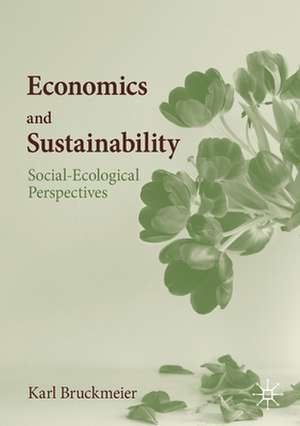Economics and Sustainability: Social-Ecological Perspectives
Autor Karl Bruckmeieren Limba Engleză Paperback – 22 noi 2020
This textbook provides an overview of economic perspectives on sustainability. It synthesises economic, ecological and interdisciplinary sustainability research and by applying an integrated social-ecological and economic framework, demonstrates how this research can be improved and implemented in practice.
Split into three parts, the book begins by introducing a range of topics forming the basis of knowledge needed to understand the varying sustainability discourses in economics, ecology and interdisciplinary sustainability research. Chapters cover the political context of sustainability; the history of sustainability in European environmental discourses dating back to the seventeenth century; as well as various problems and forms of interdisciplinary knowledge integration and synthesis in the sustainability process. Part II reviews the core economic themes relevant to sustainable development including natural resource management, environmentaleconomics and ecological economics. Also highlighted are often neglected issues such as conflicts, disasters and interrelated crises on the way towards sustainability. The chapters in Part III discuss the future of the sustainability process. They argue for the necessity of overhauling the relationship between science and practice; explore failures and the unforeseen difficulties of sustainability transformation; and discuss how to enable a long term sustainability process that reaches into the distant future.
An innovative resource for a broad range of interdisciplinary programmes on sustainability. The book will be an invaluable reference for master and PhD students, instructors, researchers and practitioners in sustainability governance.
Preț: 504.17 lei
Preț vechi: 593.13 lei
-15% Nou
Puncte Express: 756
Preț estimativ în valută:
96.47€ • 100.100$ • 79.82£
96.47€ • 100.100$ • 79.82£
Carte tipărită la comandă
Livrare economică 07-21 aprilie
Preluare comenzi: 021 569.72.76
Specificații
ISBN-13: 9783030566265
ISBN-10: 3030566269
Pagini: 480
Ilustrații: XX, 447 p. 9 illus. in color.
Dimensiuni: 148 x 210 x 30 mm
Greutate: 0.55 kg
Ediția:1st ed. 2020
Editura: Springer International Publishing
Colecția Palgrave Macmillan
Locul publicării:Cham, Switzerland
ISBN-10: 3030566269
Pagini: 480
Ilustrații: XX, 447 p. 9 illus. in color.
Dimensiuni: 148 x 210 x 30 mm
Greutate: 0.55 kg
Ediția:1st ed. 2020
Editura: Springer International Publishing
Colecția Palgrave Macmillan
Locul publicării:Cham, Switzerland
Cuprins
Part I: The sustainability process - context and scope.- Chapter 1: The policy context of the sustainability discourse.- Chapter 2: The historical context - sustainability in the modern society.-Chapter 3: The knowledge context of the sustainability discourse.- Part II: Economic and ecological knowledge in the sustainability process.- Chapter 4: Economics outright - management of natural resources.- Chapter 5: Environmental economics - orthodox perspectives.- Chapter 6: Ecological economics - critical perspectives.- Chapter 7: Conflicts, relapse and failure in the sustainability process - neglected problems.- Part III: The future - sustainability transformation.- Chapter 8: Changing relations of science and practice in the sustainability process.- Chapter 9: Re-thinking temporal perspectives of the sustainability transformation.- Chapter 10: Recreating sustainability – conjectures and conclusions.
Notă biografică
Karl Bruckmeier is a retired Professor from the Higher School of Economics in Moscow, Russia and from the Human Ecology Programme at the University of Gothenburg, Sweden. He is associated as researcher with the New University of Lisbon, Faculty of Human and Social Sciences, CICS-NOVA, Portugal, and the South Bohemian University, Faculty of Economics, Czech Republic.
Caracteristici
Highlights the significance of economic knowledge for the broader discourse of environmental sustainability Demonstrates how to synthesise interdisciplinary research for sustainable development Includes practical and illustrative examples of successful and failing policies and management approaches for sustainability
